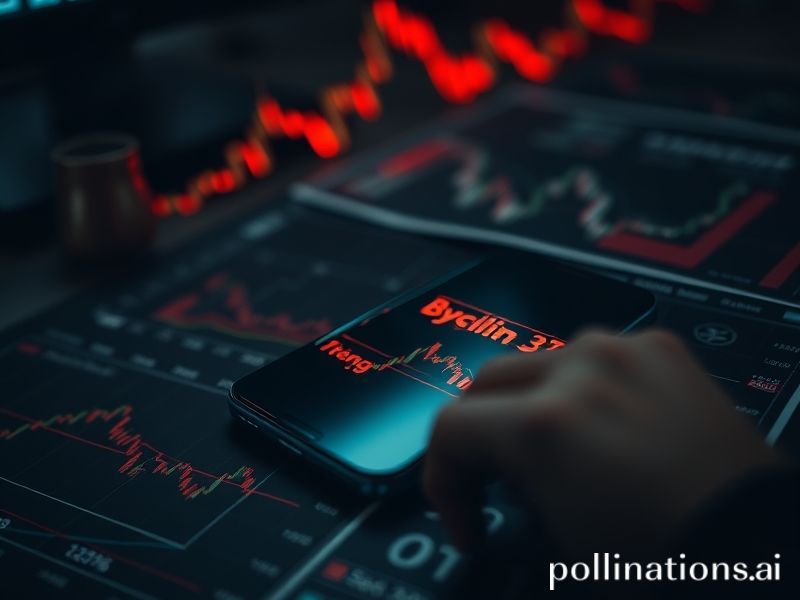Bitcoin’s Global Mood Swing: From Moscow Bars to Miami Yachts, Everyone’s Hedging Chaos with Magic Internet Money
Somewhere between the IMF’s latest growth-downgrade press conference and a Moscow bar accepting satoshis for vodka, Bitcoin decided to stage another one of its interpretive-dance routines with gravity. One minute it flirted with $72,000, the next it face-planted to $66,000, and by the time Tokyo traders returned from their third cigarette break, the digital deity had levitated back to $69,420—because nothing screams “mature asset class” like a price that doubles as a juvenile internet joke.
From Buenos Aires to Bangalore, the spectacle is treated less as finance and more as geopolitical improv theatre. In Argentina, where inflation laughs harder at peso-denominated savings than any late-night host ever could, Bitcoin’s price gyrations are simply the tango partner with the sharper heels. Across the border, Brazil’s new spot-Bitcoin ETFs are marketed with the subtlety of carnival floats, while regulators in Brasília quietly update their LinkedIn profiles to “blockchain policy consultant.”
Europe, ever the continent that likes its crises paired with fine wine, watches the ticker between debates on MiCA compliance and energy-price caps. German pension funds—those Teutonic guardians of sobriety—now allocate a “responsible” 2 % to crypto, proving you can indeed put lederhosen on volatility and call it diversification. Meanwhile, in London, the Financial Conduct Authority issues stern warnings about consumer harm, then heads to the pub where everyone pays for rounds with a Coinbase card linked to—wait for it—Bitcoin.
Asia provides the true plot twist. Beijing, having banned crypto for the 73rd time, still hosts the largest mining pools on Earth because nothing beats Sichuan hydro in the rainy season. Hong Kong, eager to remind Beijing it’s “special,” rolls out the red carpet for spot-Bitcoin and Ether ETFs, effectively turning the territory into a polite speakeasy for mainland capital. In Seoul, crypto-savvy voters are credited with swinging elections; when the price dips, presidential aides count the KakaoTalk frowns before ordering another stimulus package.
The Middle East, never to be out-dramatized, uses Bitcoin as the diplomatic equivalent of a spiked drink. Riyadh’s sovereign wealth fund is “studying” allocations while the UAE courts exchanges with tax holidays that would make the Cayman Islands blush. Tehran mines Bitcoin under sanctions so creative they could win a Cannes Palme d’Or for economic fiction, then swaps it—via ghost wallets and Russian over-the-counter desks—for baby formula and centrifuge parts. Somewhere in Tel Aviv, an analyst notes that Satoshi Nakamoto is an anagram for “Aka NSA tosh,” and the Mossad’s espresso machine sighs.
Africa, often reduced to a footnote in global finance, is quietly conducting the most radical experiment. Nigeria’s e-naira languishes like a party nobody RSVPed to, yet peer-to-peer Bitcoin trades surge every time the central bank remembers it hates capital flight. El Salvador’s volcano bonds—yes, that is the actual term—are marketed to Kenyan fintech bros who learned about dollar-cost averaging on YouTube during rolling blackouts. The irony, of course, is that the continent with the least reliable electricity is teaching the rest of us how to keep a decentralized ledger alive on diesel generators and sheer spite.
Which brings us to Washington, where regulators oscillate between labeling Bitcoin a systemic risk and a national-security imperative—often in the same hearing. The SEC’s Gensler warns of fraud, then the Pentagon awards a blockchain analytics contract to the same firm that lobbied against ETF approval. Congress, never missing a chance to grandstand, proposes a strategic Bitcoin reserve “to counter China’s digital yuan,” apparently forgetting the US already has a reserve currency, several aircraft carriers, and a TikTok addiction.
What does the price actually mean? To the IMF, it’s a volatility index of late-stage capitalism. To a Venezuelan nurse, it’s a lifeboat denominated in hope. To a Swiss trustee, it’s a custody fee. And to the rest of us, it’s the world’s most expensive mood ring—flashing green when liquidity sloshes, red when regulators grumble, and rainbow when Elon tweets.
In the end, Bitcoin’s price is less a number than a mirror: it reflects every currency debasement, sanctions regime, energy subsidy, political panic, and human delusion on the planet. And like any good mirror, it cracks just enough to keep the reflection interesting.







